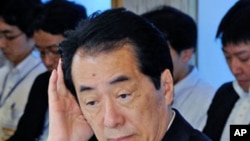Japan's governing party pushed through an extension of the current Parliamentary session by 70 days, despite the objections of the opposition. The move came as Prime Minister Naoto Kan is expected to soon announce he will step down after the approval of several critical budget bills. They are, in part, meant to help Japan recover from the March 11 earthquake and tsunami, which killed about 20,000 people, left tens of thousands homeless and triggered the meltdown of several nuclear reactors.
It is not a matter of if, but when Japan's prime minister will resign. Naoto Kan has made clear he intends to step aside but has given no precise indication publicly of when he is going to quit.
Some top officials in his own party, the Democrats, have been pressuring him in recent days to say precisely when he is going to resign. That is seen as critical for avoiding a legislative deadlock.
Chief Cabinet Secretary Yukio Edano says the Democrats have agreed to extend the current Parliamentary session, which was due to end Wednesday, by 70 days.
Edano says Kan will preside over the passage of a second extra budget for the current fiscal year that is aimed at helping those affected by the March 11 natural disaster. But Edano was more vague when speaking about whether the prime minister would be around for a third budget extension that will require parliamentary approval after the end of August.
Some lawmakers within his own party characterize Kan as stubbornly attempting to stay in power long enough to also ensure legislative approval of a bill to promote renewable energy. Opposition politicians say the prime minister should not use the energy bill as a bargaining chip for the timing of his resignation.
Kan was already in deep political jeopardy when a magnitude 9.0 earthquake struck on March 11, triggering a devastating tsunami along Japan's northeastern coast. At that time, it was expected that his resignation announcement would come within days. The tragedy brought politics to a brief pause, but the prime minister was soon back under fire for his perceived poor handling of the crisis.
Kan survived a no-confidence motion in Parliament earlier this month after promising he would hand over power to a younger generation. He then signaled he wanted to stay on the job until August.
Democratic Party sources say that former Foreign Minister Seiji Maehara is the apparent favorite among party leaders to succeed Kan. However, Maehara resigned in March over a political donation scandal, giving rise to criticism that it is too soon for his political rehabilitation.
Other potential successors include Finance Minister Yoshihiko Noda and Agriculture Minister Michihiko Kano.
Whoever replaces Kan would become Japan's sixth prime minister in five years.
The political instability is seen as hampering Japan's economic recovery - exacerbated by the March 11 natural disaster which also precipitated what will be a very costly cleanup from reactor meltdowns at a nuclear power plant in Fukushima prefecture.
The frequent changes of leadership are also viewed as complicating Japan's relations with the United States. The two countries are re-evaluating their 60-year-long military relationship. The core controversial issue is a plan to shift some U.S. Marines away from a
congested part of Okinawa.




